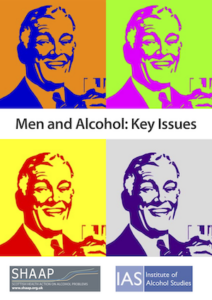View this report

Scottish Health Action on Alcohol Problems (SHAAP) and the Institute of Alcohol Studies (IAS) co-hosted a four-part seminar series to discuss issues relating to men and alcohol. The events were held across 2019 and 2020 in Edinburgh and London and were intended to stimulate debate, challenge attitudes and perceptions, and encourage people to think about future research and policy priorities.
Each seminar focused on a specific topic relating to men and alcohol and was chaired by an expert who invited guest speakers to present personal responses to pre-set questions. This paper draws on relevant literature and expands upon discussions from the seminars.
Throughout the seminar sessions, the issue of societal pressure on men emerged as a key problem to tackle if we are to make inroads on reducing harms. There is no one way to address the tropes of the ‘hard-drinking man’ or ‘one of the lads’; these commonplace identities are rooted in history, culture, gender norms, class identity and beyond.
In order to expand the ways in which men communicate, express themselves, seek entertainment and connect with others, an environment must be fostered where this exploration can take place. This means, as a start, tackling social and economic inequality, breaking down gender stereotypes and providing alternatives to substance use.
With this in mind, we have endeavoured to provide specific and relevant recommendations for research, policy and practice in order to work towards the above aims. These recommendations stem from a variety of sources, including our expert panellists, participants from our sessions, research produced by SHAAP and IAS, and WHO guidance.
A note on context: These recommendations were produced during the summer of 2020 in the midst of the COVID-19 global pandemic. The pandemic has exacerbated problems associated with alcohol harms, such as social isolation, mental health challenges and deprivation. Given this context, it seems probable that we are heading towards a period of economic downturn and further austerity. This may lead to higher unemployment, precarious work, higher levels of deprivation and cuts to services, all of which may contribute to greater alcohol harms.
Please see the full report for summaries of the seminars and key recommendations.
View this report
